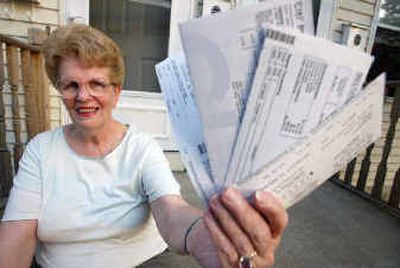Seniors encounter deep debt

NEW YORK — America’s seniors, who weathered the Great Depression or grew up in its shadow, have a reputation for frugality and saving. Of all generations, this was the one that got it right by pinching pennies, avoiding credit and putting money away for retirement and to pass on to their children.
Yet an increasing number of older Americans find themselves deep in credit card debt or even filing for bankruptcy — troubles more associated with their baby boomer children and their grandchildren.
The reasons vary, but experts say some retirees are overwhelmed by rising medical expenses or find that Social Security and their pensions don’t stretch far enough. Those who lost jobs before they were ready to retire never quite caught up.
Dollie Hawkins, an 84-year-old retiree living in Miami, dates her financial problems to 1982, when the company she worked for went out of business and she lost her full-time nursing position. She said she looked long and hard for another permanent job, but could only get short-term private duty work.
“You fill out applications and they tell you, ‘We don’t need anyone now,’ ” she recalled. “It’s not that. It’s the age thing.”
Hawkins, a widow, said that as bills “began to crowd up on me,” she turned to credit cards and ran up some $11,000 in debt. She’s trying to pay it down, if slowly, from her Social Security benefit and meager savings.
The rapidly rising cost of health care and medications is also clobbering some seniors.
Stuart D. Zimring, president of the National Academy of Elder Law Attorneys, said he’s seeing more older couples who get into financial problems because “cash flow is not keeping pace with the cost of living, particularly the cost of health care.”
And because seniors are proud and protective of their independence, they often try to hide their financial distress from their families.
“In most cases, the kids don’t know what’s happening until the crisis occurs,” said Zimring, whose practice is in North Hollywood, Calif. “Mom and dad are running up the bills for hospitalization, keeping up on the condo, medication. Then mom has a stroke and dad starts doing a Chinese fire drill and the kids get called in and don’t know where to begin.”
Just how big a problem is elder debt?
A study by Harvard University’s Consumer Bankruptcy Project found that the actual number of seniors filing for bankruptcy is still quite small. In 2001, just 82,207 bankruptcy petitioners — or 4.6 percent of the total 1.8 million — were 65 and older, the study found.
A separate study by Demos, a New York-based think tank, found that seniors over age 65 were carrying an average of $4,041 in credit card debt in 2001, nearly double the amount reported by seniors 10 years earlier.
The Demos analysis of Federal Reserve data also found that the newly retired — those 65 to 69 — were carrying nearly $6,000 on their cards, triple the level of a decade earlier.
Tamara Draut, director of the economic opportunity program at Demos, blames “weakening of the three-legged stool” that elders are supposed to rely on — Social Security, pensions and private savings.
Seniors often find their Social Security income reduced when a spouse dies. Fewer workers get traditional pensions, and may retirees have seen companies cut back their pensions or health care coverage. Savings, meanwhile, took a hit during the 2000-02 bear market on Wall Street or weren’t large enough to begin with.